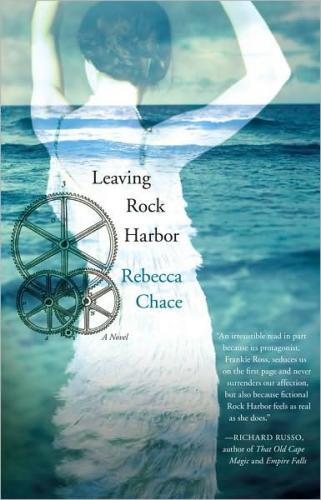 Synopsis:
Synopsis:
Frankie Ross is fourteen years old and World War I is about to erupt when the story opens in 1916. Her father recently attempted to take his own life, so her parents are moving from Poughkeepsie, New York in search of a new beginning in Rock Harbor, Massachusetts. There, her father begins working as an engraver in a cotton mill.
It is a time when socioeconomic status dictates the way life is lived, the opportunities available. Frankie walks home from school by way of the neighborhood populated with mansions where the wealthy mill owners and other power brokers reside. There, she meets two young men who will figure prominently in her life: Winslow Curtis is the spoiled and privileged son of Rock Harbor’s most powerful politician. Winslow has forged an unlikely friendship with Joe Barros, a Portuguese mill worker and high school basketball star. Joe’s sports prowess opens doors for him in society circles that would otherwise remain closed to anyone of Portuguese descent. Frankie, Winslow, and Joe become fast friends, and Joe develops strong feelings for Frankie that he keeps to himself.
As Frankie grows to adulthood, the world around her is changing, as well. The War ends, and Joe returns home to become a union organizer. Joe has always loved Frankie, and wrote to her regularly from the European battlefields where he was wounded, but despite her feelings for Joe, Frankie impatiently marries Winslow and gives birth to a son, Geoffrey. The Jazz Age brings more wealth, endless and meaningless partying, drinking, and sex. As mill employees protest their working conditions and meager wages, Frankie finds herself torn between the bargain she has made with the upper class by marrying Winslow and her working-class roots. Frankie’s father becomes embroiled in the battle for unionization while Frankie’s marriage to Winslow crumbles under the strain of decadence lacking any foundation in true emotion, her unrelenting desire for Joe, and her attempts to assuage her guilt over the accident that took place years earlier while Winslow and Joe were giving her a tour of the mill. By the early 1920’s, mills in the southern states were booming and it has been said that, after the Crash destroyed fortunes and lives, the Depression took hold first in New England’s formerly booming mill towns. Frankie must forge a new life for herself and Geoffrey, despite all that has happened.
Review:

Thus, Leaving Rock Harbor is impressive in its meticulously researched historical accuracy. Chace explores, in intricate detail, the layout and operations of the mills, the socioeconomic climate of the time, the struggles of the mill workers, the fight for unionization and decent wages. Her descriptions of the conditions in which child laborers toiled are chilling and, to present-day readers, quite unbelievable. The book is plainly an homage to Chace’s familial heritage and that short period in U.S. history when the textile industry enjoyed a level of success it has never regained.
The story of Frankie’s journey from childhood to a marriage characterized by luxury and wantonness, and back to poverty is an intriguing premise. Against the backdrop of such a fascinating time in American history, and the complexities of the relationships between persons with such divergent backgrounds, all of whom are seeking the best lives they can live in a country that has beckoned them and/or their ancestors, Leaving Rock Harbor should be a spellbinding, deeply affecting tale of love, poor choices, and loss.
Unfortunately, Leaving Rock Harbor is a disappointment because it fails to live up to its potential. Chace seems to have spent the bulk of her time performing historical research, the results of which she painstakingly poured into the pages of the book. I wish that Chace had taken the same level of care with the development of her characters. The majority of the cast are superficial, at best, and they move through the events of the story in a seemingly purposeless fashion. There is no little to no explanation offered for their actions or demonstration of their innermost feelings and motivations. Beginning with Frankie’s father, who obviously suffers from depression given that he has recently attempted suicide, and Frankie who, as a fourteen-year-old girl has been given the unenviable job of “babysitting” her despondent father to make sure that he does not succeed next time, the characters meander aimlessly from one experience to another.
The lack of character development is particularly exasperating with regard to Frankie, who narrates the story. I kept reading because I wanted to care about Frankie and her life choices. I wanted to invest in her journey. I wanted to understand why she made the choices she did . . . and see her gain some insight into why, in so many instances, those choices were disastrous. Most of all, I wanted to cry about her failures and rejoice when she learned something from her mistakes. Ever the optimistic reader, I was convinced that Chace would somehow overcome the shortcomings in her writing and satisfy her readers by and with the book’s conclusion.
Some choices are irrevocable.~ Author Rebecca Chace
My optimism was squandered. I read the entire story of Frankie stumbling from one selfish choice to another. As a “coming of age” story, Leaving Rock Harbor fails because Frankie gets older, but never really matures. I will not divulge the book’s ending, other than to say that it so infuriated me, I was sorry that I stuck with Chace to the very last page. Frankie’s final choice was simply another example of her narcissistic meandering from one doomed relationship to another.
Perhaps I am a too-idealistic reader. Maybe that was the point Chace wanted to make, but based upon the interviews she has granted in conjunction with the book’s release, I don’t believe that to be the case. Sadly, I cannot recommend Leaving Rock Harbor except as a richly descriptive recitation of the history of America’s mills and the political climate in which they rose to industrial prominence and, just as quickly, dropped into obsolescence. Chace is a talented writer, and I hope that her future work will evoke an emotional response from her readers by revealing her characters’ inner dialogue, motivations, and reactions to their experiences. I enjoy reading stories about people who, by the end of the tale, have learned and evolved as a result of what has happened to them on the preceding pages. Leaving Rock Harbor is not such a story.



1 Comment
[New Post] Book Review: Leaving Rock Harbor https://www.jhsiess.com/2010/12/29/book-r…